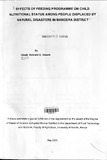| dc.description.abstract | This study was carried out to assess the effects on the nutritional status of under-fives
of a feeding programme carried by Medicos Sin Fronteras-Spain (MSF-Spain) in
Mandera district. Data from the routine programme monitoring collected in the process
of implementing the project and, from a cross-sectional survey carried out at the time of
study was analyzed. The study population consisted of 857 record children for the
retrospective component, 516 mothers and children still in the programme at the time
of study, and 50 mothers and children who had been discharged. Regression analysis
was utilized to describe the functional relationship between weight gain for children
while undergoing the programme and independent variables namely age, sex and
nutritional status of the child at admission, the length of stay of the child in the
programme and time/period of admission for the child in the programme. This was in
addition to the use of other statistical tools like chi-square testing and the Analysis of
Variances (ANOVA).
Results indicated that 86% of children registered in the programme were severely
wasted at admission «-3z-scores). Significantly more males than females were
severely wasted (2: 1). The age groups 12 to 36 months had higher levels of wasting as
compared to the other age groups.
An overall average weight increment of 800 grams was reported for children while in
the programme. A higher proportion (61%) of children admitted showed improvement in
nutritional status as measured by W/H while in the programme and only 2.3% resulted
in a poorer nutritional status than their initial status. Girls responded to "treatment"
better than males. And 1996 recorded the highest weight gain, (1,100 grams) as
compared to a paltry 510 grams in late 1998. On overall, factors that were reported as
significant predictors of weight gain for children while undergoing a feeding programme
included sex and age of the child, time/period of entry into the programme and
nutritional status of the child at admission. The length of stay for children in the
programme was, however, reported not an important factor in determining nutritional
status change for children undergoing a feeding programme.
A significant proportion of children (28%) had their nutritional status (as measured by
W/H) worsened after discharge from the programme. The sex and age of the children
still featured significantly in explaining the nutritional status change at follow up even in
the presence of other factors.
Majority of the community members had a positive perception on the project in the
early years of its inception. This had, however, gradually turned to dissatisfaction in the
final days of the programme mainly due to fatigue of staying longer in the programme,
change of project operations from "wet" ration feeding to "dry" ration feeding, and
recognition by some members of the community that they needed to be actively
involved in mapping out sustainable projects.
It is recommended that feeding programmes should be necessarily short-term to avoid
dissatisfaction that comes with time, and that such programmes should attract
community participation in all stages of project cycle. A continuous and comprehensive
evaluation of such programmes is also recommended. | en |

